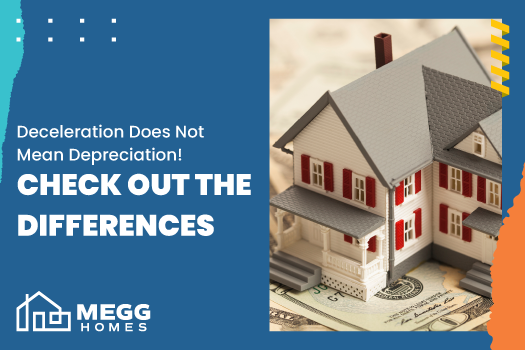If you’ve been paying any attention to the housing market of late, you’ve surely heard the terms “depreciation” and “deceleration” constantly bandied about. You may even have heard the two terms used interchangeably, which they shouldn’t be. You may also have heard financial experts and economic pundits drawing clear distinctions between the two, arguing which better describes our current market condition. What is the truth about these two terms–depreciation and deceleration–and why does it matter?
Definitions of Terms
In real estate, depreciation and deceleration refer to the movement of home prices, as does a third term, appreciation. Each term describes a different type of movement:
- Appreciation – When home prices rise
- Depreciation – When home prices fall
- Deceleration – When home prices continue appreciating, or rising, though at a slower rate
It’s important to note the differences between the terms as they matter considerably in properly analyzing current market conditions and making decisions about your money and assets.
Depreciation vs. Deceleration: It’s All About Pace
The differences between depreciation and deceleration are significant. Firstly, depreciation indicates a lowering of home prices, while deceleration indicates an increase in home prices. Moreover, depreciation does not imply a particular rate or pace of that change, in this case downward, while deceleration is distinctively a factor of the rate or pace of change in home prices–merely of a change upward, or an increase rather than a reduction, in prices.
In other words, when home prices depreciate, they go down; when home prices appreciate, they go up; and, when home prices decelerate, they continue going up following a period of going up, or acceleration, only more slowly than they just had been. As a consequence, deceleration can only follow a period of acceleration. In other words, home prices already have to be rising for them to now be rising slower; deceleration never follows a period of depreciation, because there’s no upward pace in effect to use as a reference for comparison.
Historical Home Price Trends
While home prices have been shooting up in the past two years during the COVID pandemic, they had already been appreciating since 2012, a period of 122 consecutive months; they just increased at an accelerated pace in 2020 and 2021. Similarly, home values have risen for the last 10 years consecutively and have only risen at a much faster rate in the past two years.
The basic explanation for this acceleration is the same explanation for every move up in real estate prices and values: home buyers outstripped home sellers. In other words, there’s been more demand than supply–specifically more demand for homes to buy than a supply of homes to meet that demand. This causes bidding wars and allows sellers to list higher asking prices.
The reasons for these shifts in supply and demand, this alternating appreciation and depreciation of homes, varies from period to period. In this latest period, it’s COVID that’s mostly to blame.
Forecasts for the Future of Home Prices
As recent data shows, homes continued appreciating into the late-spring/early-summer of 2022. Experts forecast continued appreciation in the months to come, only at a decelerated rate. In others, home prices will continue to rise, only more slowly now. And, as long as a gap remains between a larger number of buyers and a smaller number of sellers, a reversal into depreciation of homes for sale in Lakeland is unlikely to occur.


